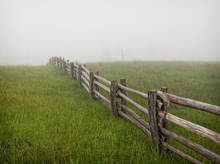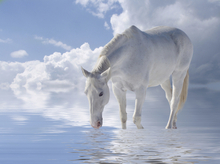
Your horse is gone. Whether this occurred unexpectedly after an accident or whether it was a decision made with love and courage for a beloved senior horse who was ill and in pain - now you face some major decisions as well as handling your own feelings.
Practical considerations have to be dealt with. Even a small horse represents a large body that has to be properly disposed of. This may seem callous at a moment when you are truly overwhelmed but time is not on your side. The body will start to decompose very quickly unless you are in the middle of a deep freeze in the winter.

Dealing with reality and grief when a horse dies
Your horse is gone. Whether this occurred unexpectedly after an accident or whether it was a decision made with love and courage for a beloved senior horse who was ill and in pain - now you face some major decisions.
So what options do you have? Many people simply want to bury their horse. If you have a large piece of land this may work very well. A horse should be buried approximately six feet down, thoroughly covered and the dirt above tamped down firmly. Grass or flowers can then be planted over the grave. Many states such as New York stipulate three feet but if you can go deeper, do.
A hole big enough for a horse means hiring a backhoe. Figure your cost will run between $200-400 dollars in most locations. Before you make that call though, you need to consider zoning. Many towns, counties and states have laws about the burial of large animals. They may forbid it entirely or stipulate how deep the animal must be buried and how much land must be available.
The grave site must be away from the water table. In Kentucky, the abdomen must be slit open for more rapid decomposition and you must spread a thick layer of lime over the body.
If you have a large piece of property you may decide to simply do this and worry about the legalities later. Unfortunately one complaint could lead to forcing you to dig up the body and pay a fine. Still, if burial is allowed, this is a good option.
Large landowners may simply choose to put their horseâ's body w-a-a-ay back in the fields or woods and leave it to decompose naturally with the help of scavengers. Again, this may work out for you.
On the other hand, if your neighbor's dog returns home with a large bone, you may find the local law enforcement officers knocking on your door. There are also concerns about wildlife eating the horse if it was euthanized, as the medications will be present in the body. Do you want to attract coyotes to your farm? Probably not.
Did you know?
If your horse is insured, you need to notify your insurance company promptly and do not dispose of the horse until an adjuster agrees. The owner, not the insurance policy, pays for the necropsy.
If your horse is at a boarding facility or you only have a small lot, you need other options for body disposal. One option is to see if your local landfill will accept bodies. You will need to arrange transportation in most cases and pay a fee so this won' mt be inexpensive, but this solution can be quick and easy.
Contacting a local pet cemetery is always worth the effort but many draw the line at burying an animal as large as a horse. Still, for a miniature horse or donkey, a pet cemetery may be the perfect solution. Be prepared to pay for the plot and care of the grave site. Expenses will vary.
Some rendering plants will dispose of dead horses but they may have regulations about how the horse died, etc. Some will pick up the body but others require you to transport your horse. Many horsemen have trailers but getting a dead horse onto a trailer is not usually a feasible idea. A flatbed truck is a much easier option.
Transportation is usually required if you arrange to donate your horse to a local university for research and cremation. The hassle can be worth it as you may contribute to equine knowledge. I highly recommend that once your horse is gone you walk away. If you have made the disposal arrangements others can deal with the situation. It is very hard to watch your horse 's body being removed.
Along with your own sorrow you will need to deal with the grief of your other animals. Horses are social/herd animals. The loss of a member is deeply felt by all of them.
Once you have dealt with all of the stress of disposing of your horse you now have to face your grief and that of your other horses. There are felt to be five basic stages of human grief: denial, anger, bargaining, depression and acceptance. Anger is often mingled with grief. Once your horse has passed on there is no bargaining left.
Denial can sneak up on people. You know your horse is gone but you troop down to the barn and put his feed in his bucket because that is what you have done for the last 15 years every morning. And then, reality hits you. Or you wake up and plan your daily ride, then realize it won't be happening any more.
Anger and guilt can mingle together to make you miserable. If your horse got out of his pasture and was hit by a car you will inevitably be angry at whoever didn't close the gate firmly or check the fences or whatever. You will feel guilt that you didn't check the fence and the gate, or notice your horse's discomfort earlier so the colic might have been treatable.
Unfortunately accidents happen and sometimes life itself gets in the way of our routines. Maybe you were ill with the flu and didn't get out to check on your horse for one 24-hour period. All of the anger and guilt can't change the outcome no matter how badly we feel.
Depression tends to follow. Perhaps your horse was born on your farm and was the horse who took you to great heights in your chosen sport. Or maybe he was an older gelding you bought at an auction who turned out to be an amazing ride and wonderful companion. No matter what, there is now a big hole in your day, your life and your heart.
To quote Shakespeare:
When I bestride him, I soar, I am a hawk: he trots the air; the earth sings when he touches it; the basest horn of his hoof is more musical than the pipe of Hermes.
How you progress in dealing with your grief is very individual. Don't let others rush you past your feelings or minimize them. You may feel you have totally moved on and are past the sadness and then a Facebook video brings back all your memories. Making a memory book or holding a "remembrance of life" event for your horse may help you.
In time, your heart starts to heal as you accept your new reality. For some people, getting another horse is the way to healing. For others, leaving the horse world or moving into a different equine sport is a solution. The timeline for these stages and the final outcome will vary with each individual. There is no "right" way to deal with the loss of a horse.
Along with your own sorrow you will need to deal with the grief of your other animals. Horses are social/herd animals. The loss of a member is deeply felt by all of them. True, the mare who hated your now-gone mare, may feel deeply good, not bad! but most of your other equines will feel the loss.
I lost our Arab gelding over a year ago. Our other horses stood and watched over a fence as he was buried, holding vigil despite the cold. For months afterwards, the mares would go stand over his grave in the cold, in the wind, with snow falling on them.
My Appaloosa mare had been with him for over 20 years - the Quarter Horse mare for about 15 years. They had been a compatible herd and now there was a loss. Both mares still stop by his empty stall a year later and look in. Maybe they hope he was just away and will return.
Some horses will go off their feed when a companion dies. Others, especially if it was a herd of just two, may neigh and search for their partner. Stable vices may develop. It is important to help your horses with their grief even as you suffer.

Keeping good memories of your horse
In time, your heart starts to heal as you accept your new reality....expect the grief and sadness and find a positive way to remember your horse.
Extra time and attention is important. Plan some extra grooming or *TTouch sessions. If your horses enjoy trail riding or work, schedule in some extra time in the saddle. Consider adding a companion - if not an equine, another animal.
You may decide to add another horse to your life or you may decide you can't handle it. There is no ârightâ choice â it is highly individual. Follow your own heart & instincts.
I find it helpful for me to memorialize my lost animals in some ways. Donations to equine research or equine rescue means some horse will benefit from my loss. If your horse is purebred, many breed organizations have rescue and health foundations. Or you may have a worthy local group that helps all horses. Obviously this doesn't clear out my grief or bring my horse back but it does make me feel better.
Horse sanctuaries are always in need of donations of money or supplies. You can make a "twofer" by donating to an equine assisted therapy program - helping people and horses. If you decide the horse phase of your life is over, consider donating your equipment to the local horse 4-H group.
The loss of a beloved horse is a tough time in your life. I have now lost a few of my own horses over the years and it is never easy. Try to be prepared for the logistics of an equine death, expect the grief and sadness and find a positive way to remember your horse.
*TTouch - What is it?
Tellington TTouch - is a specialized approach to care and training and is a method based on circular movements of the fingers and hands all over the body. The intent of the TTouch is to activate the function of the cells and awaken cellular intelligence - a little like "turning on the electric lights of the body"
